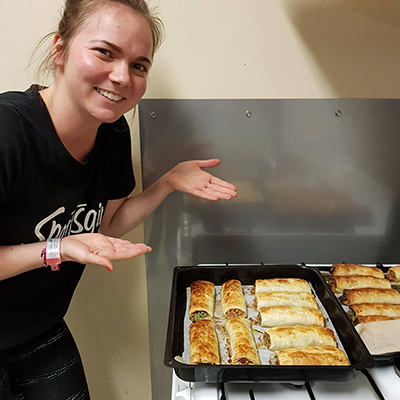I was 22 when I had a stroke
By Hannah
The day started with my usual morning run. It was just after 7am on a cool July morning. During the run, I began to realise I was deviating to the left. I thought this was strange, but I didn’t have too far to go to get back home so I kept running. Then suddenly my legs gave way and I fell to the ground.
I didn’t know what was going on. Fortunately, I was still conscious and managed to call my brother’s girlfriend Isy on my mobile phone. My speech was slurred and I was a bit scattered when I described where I was, but she understood enough to pick me up.
Isy took me home where Mum was waiting outside. As soon as Mum saw me she knew exactly what had happened. She’d worked in the neurosurgery ward at Royal Melbourne Hospital and didn’t waste any time calling an ambulance.
At the age of 22, I was having a stroke.
After treatment, I remained in hospital for four days and then spent almost 4 weeks in rehabilitation. My therapy included occupational therapy (hand hub, cooking and woodwork), physiotherapy, speech pathology and hydrotherapy.
I felt fine throughout my inpatient recovery, possibly because there was always a therapy session to attend or someone visiting me. It became tougher when I became an outpatient. I wasn’t able to work or drive and I struggled with the loss of my independence. I visited a psychologist at the rehab centre. It was so good to be able to disclose things I didn’t even know were an issue for me.
Physically, the right side of my body is quite unbalanced and uncoordinated now, while the left side has decreased sensation. Originally it was from my neck down, but now it’s just in my leg. While this isn’t debilitating, it is uncomfortable at times. I get fatigued more quickly than before my stroke, and my brain finds it hard to concentrate at times and struggles to process many concepts at once or quickly.
The main change from a social perspective is I am no longer able to drink alcohol, but I haven’t found this to be an issue. I also haven’t gone back to playing netball, which I really enjoyed as a social activity. I don’t feel my brain can handle all the quick decisions.
Today, I am doing my Masters in Social Work and I work two days per week – one day in an administration role and the other at a café. I definitely still have areas that need improving but nothing that is impeding my everyday functioning, which I’m grateful for.
During the last 10 months, the support of my loved ones has been so, so, so important! I’ve had my close network of family and friends with me every step of the way. Nothing was ever too difficult for them to do for me. People always wanted to be present and show how much they cared and this was crucial to me after long days of rehab and therapies. I never had to wonder if I would be supported, because I was incredibly thankful to have so many wonderful people around me.
This includes the hotel manager I worked with before I had my stroke. Iqbal had an idea to organise a fundraising event at the hotel. His inspiration for the event was to bring awareness to stroke and highlight the fact that it can impact people at any age. We decided to wait until I had a recovered a little and was able to attend so the ‘Run for Hannah’ event was held on 9 December 2017. It was a 12-hour treadmill challenge where people were able to run/walk for half-hour intervals or just come down with some mates to support a great cause. We raised more than $7,000 for the Stroke Foundation. It was an awesome day!
I wanted to share my story as I think it’s really important everyone understands that stroke can happen to anyone – it doesn’t matter how young you are, how fit you are or what gender you are.
It’s been challenging, but I’ve learnt a lot during this experience. Having a support network around you and people encouraging you makes all the difference. This gives you a reason to try harder or for longer when you might not really want to. And even if something is frustrating (and this might sound like a cliché), you have to keep pushing on because the result will be worth it. Even if the result is only tiny, it’s better than nothing, and each time you practise it will get a little bit better – every small step adds up.

